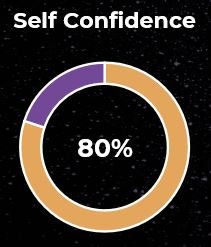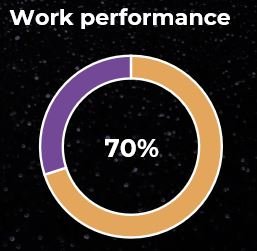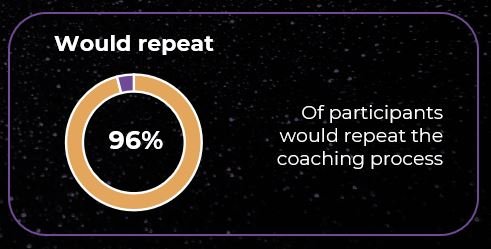Leadership & Team Coaching to Boost Performance & Well-being
Coaching for Leaders & Teams Who Want to Succeed
Interested?
Talk to us!
Coaching helps leaders become more confident with a positive ripple effect on the entire organization
The coaching journey
Serves as a transformational experience to develop new leadership skills and unlock the individual's full potential
Develops skills for self-understanding so the individual can identify their values, beliefs, and emotions, that drive or impact actions and performance
Provides space for reflection and inspiration outside of the organization in a safe space to develop new ideas and a growth mindset

Coaching has been proven to improve both performance and wellbeing
Share of respondents who had seen improvements in the following area
A Global Coaching Client Study conducted on behalf of the International Coach Federation (ICF) found that
of those individuals who had received coaching saw improvements
Coaching can support many areas of an individual's life
Career development
Professional growth and preparing for a new role
Navigating new responsibilities and teams
Addressing challenging situations at work
Wellbeing and commitment at work
Challenging interpersonal relationships at work
Finding personal ways to reach work-life balance
Unraveling dis-satisfaction with current job/life
Performance and productivity
Developing problem-solving skills
Improving organization & time-management skills
Getting clarity and direction in bigger projects
Coaching program overview
Individual coaching: Time fully dedicated to your needs
Includes a 30 min intro call as well as a 30 min ending de-brief
Dedicated personal coach
60 min session length
Program length: 6 to 12 sessions
Fully virtual delivery
Flexible scheduling: 2 to 4 weeks recommended
Interested?
Talk to us!
What our clients say they get out of coaching
“Coaching has helped me to better understand others and put myself in their shoes, which has been a tremendous help with interpersonal relationships at work and at home. I’m able to better navigate stressful situations and disagreements, and negotiate compromises or even win-win solutions.”
“I was facing big changes in my career and feeling uncertain and terrified. Coaching with Saara made me feel much more confident in navigating the transition, reducing my stress-levels and becoming more self-aware.”
“The self-exploratory coaching approach with Marko has made me more aware of my strengths that I can leverage to address the challenges I face.”
What has driven companies to offer coaching
Larger organizational changes
- Driven by M&A, high growth, or sudden staff reductions
Willingness to invest in retaining key employees
- Driving well-being and motivation at work
Ensuring new ways of working
– e.g. managing teams in the hybrid world
Showing your organization that you care
– Make your employees feel valued

Participants are overwhelmingly satisfied – and employers are getting value for their investment
The 2009 ICF Global Coaching Client Study, the 2010 ICF Global Consumer Awareness Study, and the 2012 ICF Global Coaching Client Study, were commissioned by the ICF but conducted independently by the International Survey Unit of PricewaterhouseCoopers.
Interested?
Talk to us!
Who should you offer coaching to?
A typical coachee is motivated, open to dive deep and do the work
for their personal and professional growth
They tend to face some challenges or new opportunities in the organization, that require space for reflection and development – in a safe space with someone outside of the organization.
Coaching is for those who wish to maximize their potential and are willing to put in the effort and take responsibility for their personal and professional growth.
Coaching can be suitable for all roles in an organization – from Executives to Key Employees
As a sponsor for the coaching relationship, you are involved in setting the overall program goal
Sponsor
Shows willingness to invest in employees’ growth and wellbeing
Identifies the employees in the organization that would benefit from coaching
Part of three-way contracting call to align on objectives of coaching series
Coachee
Takes responsibility for self-development - by defining the topics to discuss
Gets clarity or next steps for how to move forward after evaluating options
Grows by reflecting on strengths as well as limiting beliefs, learned behaviors and patterns, discovering options and choices
Coach
Facilitates coaching journey, to clarify the vision and goals of the coachee
Challenges the coachee’s thinking and ideas when useful
Is the coachee’s advocate and support, who motivates and empowers to take action
Multiple benefits of conducting coaching virtually
Maximum Flexibility and Accessibility - Easy to meet
Easy to organize in a hybrid world, where our work locations can vary
Fit coaching sessions easily to your life without needing to commute (allowing daytime sessions)
More flexible scheduling and better opportunities to get coaching for just-in-time challenges
Comfortable environment à Easier to address sensitive topics
Participating in the sessions from a place that feels most comfortable and safe, and having physical distance, may make it easier for you to share your fears and thoughts
Limiting possible distractions and disruptions of sessions from regular workspace
Supports skill development aligned with today’s ways of doing business
Virtual coaching represents the world that many companies and their staff are operating in currently, helping them facilitate practical virtual discussions that help deepen relationships
Cost-effective and environmentally friendly
More affordable due to not paying fees for commuting, as well as reducing the carbon footprint
Interested?
Talk to us!
What Coaching is NOT?
Coaching is not THERAPY: Even though coaching can help to tackle burnout and increase mental strength, it is not a substitute for a qualified mental health professional. Coaching is future-oriented and goal-focused, whereas therapy often goes more into the person’s history. If the situation requires, we might refer you for additional help.
Coaching is not MENTORING: The coachee is the best professional of their life and we believe all the answers are already within. We do not give advice or guidance in form of mentoring. Coaching focuses on asking questions to raise awareness and helps the coachee in making educated choices. The coachee is responsible for working towards their success and coming up with options that suit their situation, as well as taking responsibility for themselves.
Coaching is not a quick fix: Coaching is hard work. Engaging in challenging discussions and being vulnerable can get uncomfortable. This interactive process includes answering tough questions, reflecting, and being open to making changes. Coaching has the potential to take you to your goals, however, it doesn’t come without putting in the work and effort.
Coaching is not surrogate LEADERSHIP: Coaches help to develop skills, that help the staff grow in their roles. Coaches are often external to the company. The leadership responsibilities such as decision-making on the company’s behalf and giving performance feedback should not be delegated to the coach.











